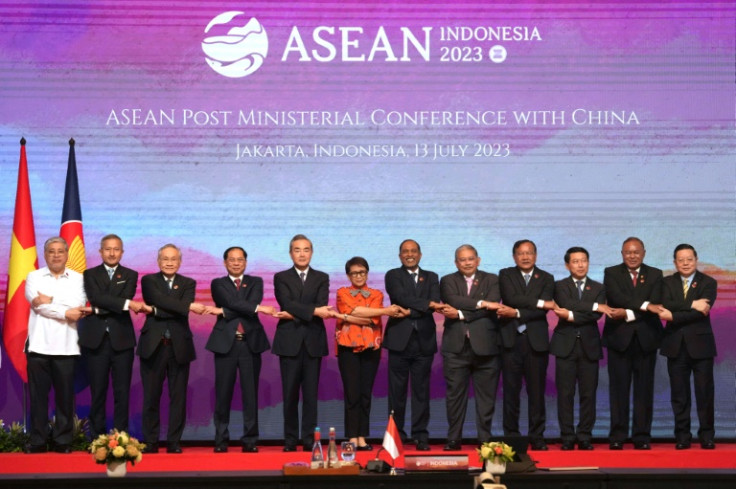ASEAN Nations Forge Deal To Enhance Trade Customs Clearance, Led By Philippines

KEY POINTS
- The customs agreement aims to improve the 10-member bloc's trading environment
- Six ASEAN members will kick off pilot implementation at the end of the year
- Majority of Southeast Asian countries improved their trade facilitation scores this year
Members of the Association of Southeast Asian Nations (ASEAN) have signed a deal to enhance customs clearance among member states, as announced by the Philippine Bureau of Customs (BOC) on Thursday.
The signed Mutual Recognition Arrangement (MRA) between ASEAN nations "seeks to provide a predictable and transparent trading environment" among members, the BOC said in a press release. The MRA was signed last month, the BOC said.
#BOCNewsToday | The 10 ASEAN Member States (AMS) signed the Mutual Recognition Arrangement (MRA) of their respective Authorised Economic Operator (AEO) Programmes on 19 September 2023.
— Bureau of Customs PH (@CustomsPH) October 12, 2023
Full story : https://t.co/eMF14lj5qs pic.twitter.com/Zaz4cz46eO
Under the MRA, the member states are expected to provide "expedited clearance by reducing documentary checks and/or physical cargo inspection." Additionally, ASEAN members will grant priority checks for cargo exported from or imported by a member and establish an information exchange mechanism to streamline customs processes.
Once domestic administrative procedures are finalized, a six-month pilot program for the deal will be implemented by six countries within the 10-member bloc, set to commence at the end of the year. The participating countries in the pilot program are Brunei, Indonesia, Thailand, Singapore, Malaysia, and the Philippines.
The remaining members, including Cambodia, Vietnam, Laos, and Myanmar, will initiate their own pilot implementation in 2024. Full implementation is scheduled for the third quarter of 2024.
It's worth noting that this arrangement is not legally binding on any ASEAN nation. Members will implement measures under the MRA based on their respective domestic practices and laws.
This news regarding the customs trade arrangement comes several months after the release of the United Nations' Digital and Sustainable Trade Facilitation report for 2023, which revealed that the majority of Southeast Asian countries had improved their scores since 2021.
Singapore's digital and sustainable trade facilitation improved from 95.70% to 96.77% in 2021, while the Philippines improved from 86.02% to 87.10%, and Timor-Leste raised its score from 24.73% to 30.11%. Cambodia, Indonesia, Laos, Vietnam, and Malaysia also improved their scores over the past two years.
The bloc considers customs facilitation as an integral part of realizing ASEAN's vision of creating a single market and production base with equitable economic development fully integrated into the global economy, as stated on the bloc's official website.
In recent months, the bloc has been strengthening ties between members in various sectors, including defense, finance, and technology, in response to concerns about unity over recent regional issues such as Myanmar and territorial disputes with China.
In June, reports indicated that the grouping was drafting ethics and governance guidelines for artificial intelligence to balance the benefits and risks of this fast-evolving technology.
Regarding finance, in July, the bloc announced that the central banks of Singapore, the Philippines, Malaysia, and Thailand were collaborating to establish a cross-border payments system that would facilitate faster, cheaper, more transparent, and more inclusive transactions between participating nations.
In the realm of defense, the grouping conducted ASEAN-only joint military drills in Indonesia last month, marking the first-ever exercises among bloc members. The bloc's goal is to demonstrate unity in the face of challenges, including China's military threat and economic influence, as well as divisive issues such as Myanmar.
© Copyright IBTimes 2025. All rights reserved.




















